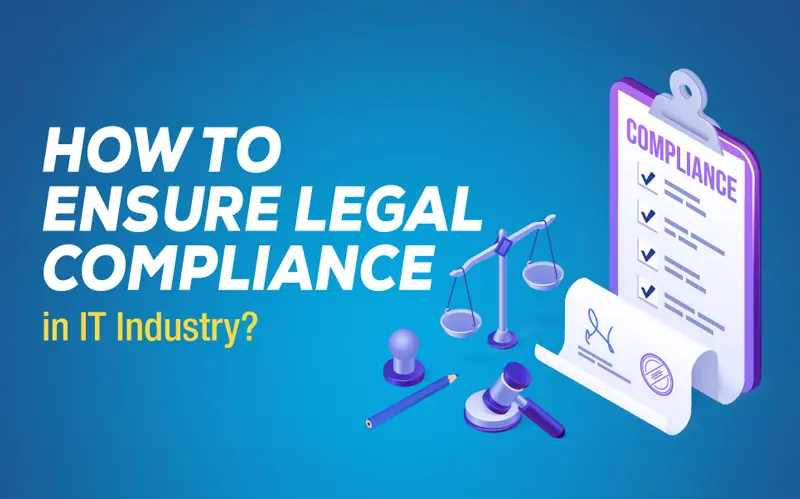

How to ensure Legal Compliance in IT Industry?
Published at: Mar 31,2023

Information technology (IT) companies play a significant role in shaping our economy and society. Introducing initiatives such as Start-up India, Make in India, and Digital India has highlighted the significance of innovation in the technology sector. This is particularly important as technology is the foundation of nearly all other businesses and industries. IT companies are required to comply with a range of legal regulations to ensure their operations are lawful and secure.
1. Registration
Under the Companies Act 2013, an IT company is required to be registered to conduct business in India. IT companies will have to be registered to sell any software (good or service) It may be Partnership Firm, LLP, Private Limited Company, One Person Company (OPC).
When registering for a partnership firm, LLP, or company registration, specifying a business name is mandatory. As the name of your IT company will serve as your defining identity, it is crucial to secure ownership over your business name.
2. Ownership Over Intellectual Property
For early-stage IT businesses, it is advisable to secure ownership over intellectual property, such as trademarks, brand names, and patents. This is because, in case of potential infringement, like someone else using the same logo, name, or goodwill, it is easier to establish your rights over the intellectual property. Additionally, investors often consider the value of intellectual property while evaluating the worth of a start-up business. For those involved in scientific inventions, obtaining a patent registration at the earliest is crucial as the process of filing for an actual grant takes approximately five years in India.
3. Negotiating Confidentiality Clauses & Copyrights
Information Technology is a people-centric industry where skills play a vital role, from searching for the top coders and developers to providing them with competitive packages. Nevertheless, it is crucial to negotiate confidentiality clauses with employees to ensure that the programs and codes they develop during their employment are owned by the organization and not by the employees themselves. To accomplish this, employment contracts should contain rigorous clauses related to copyrights and substantial penalties for breaching confidentiality.
4. Cybersecurity Laws
Cybersecurity is a critical issue for IT companies as they handle sensitive information and data. Cybersecurity laws and regulations aim to protect IT companies and their customers from cyber threats and attacks. IT companies must implement robust cybersecurity measures to protect their data and prevent cyber-attacks.
5. License, Permits, and other Approvals
Common Licenses and Legal Registration For opening an IT Company in India are:
a) GST Registration
b) Trademark Registration to Protect Your Brand Name.
c) Copyright Registration on Your Source Codes
d) Patent Registration on Technology
e) Software License Agreements
Conclusion
As your IT company grows larger, it may be subject to various taxation, labor legislation, and corporate legal compliances. In such circumstances, outsourcing such work can be a wise decision as it allows you to concentrate on your core competencies and meet deadlines more efficiently.
If you’re considering outsourcing your accounting functions, your search for a reliable partner ends here. Ease Up can help you. We provide Legal & Compliance Services for Tech Companies and also we are the leading Accountants for Tech companies in India. We have provided services to multiple Tech companies and helped them in their accounting and bookkeeping operations.
We at Ease Up are a full suite Financial Management service provider for Technology and Digital Companies like Software Companies, Information Technology Outsourcing Companies, IT Enabled Service Providers, SAAS-based companies, etc.
Transform your financial management and take your tech startup to the next level with the help of Ease Up today.

CA Aditya Chokhra
September 10, 2025

Empower Your Business with Expert Financial Consulting
Latest Post
Leave a Reply

Contact us and subscribe to our newsletter to receive expert advice and industry updates.

Mumbai: A-116-1st Floor, Super Shopping Complex, Bajaj Cross Road, Near Kandivali Station, Kandivali (W), Mumbai 400067.
Ahmedabad: 315 Abhinav Arcade, Nr. Kothawala Flats, Paldi, Ahmedabad 380007.
Pune: B 602, The Onyx, Pink City Road, Shankar Kalat Nagar, Pune 411057.
Gurgaon: 1123 JMD Megapolis, Sector 48, Gurgaon - 122018, Haryana.
Bhilwara: C - 147, Shashtri Nagar, Bhilwara (Raj).
Surat: 6019, World Trade Center, Ring Road, Surat - 395002.
Copyright © 2025 Easeupnow. All rights reserved.





















